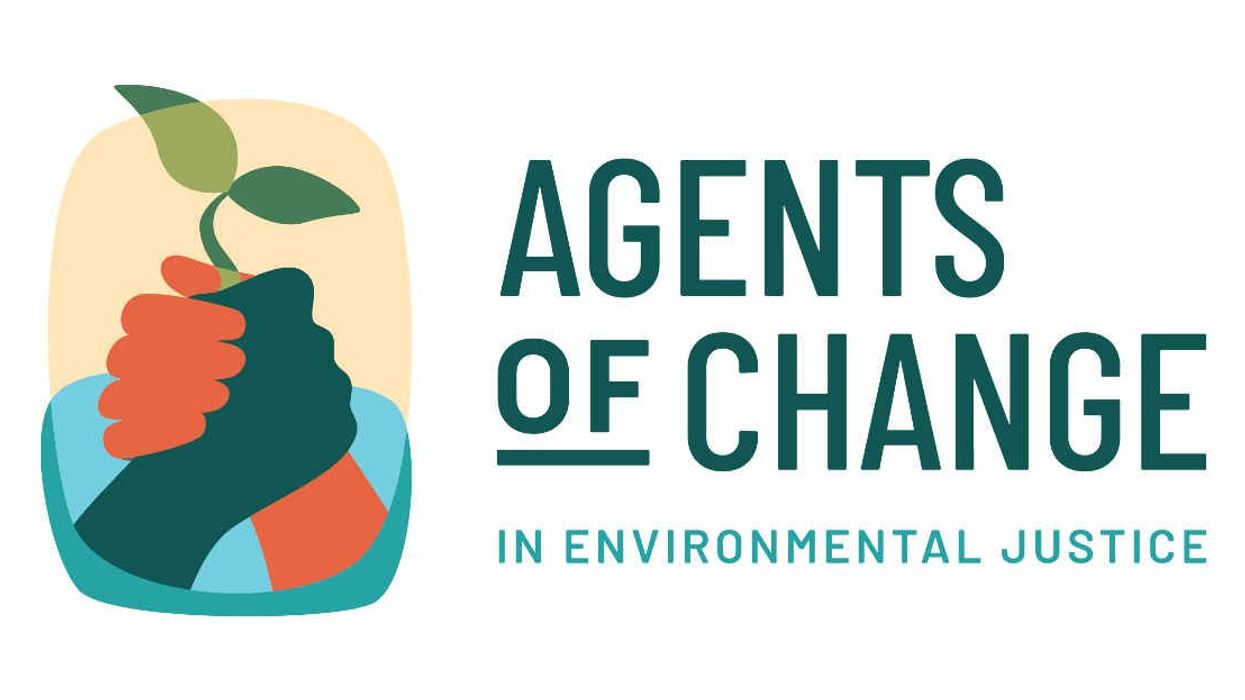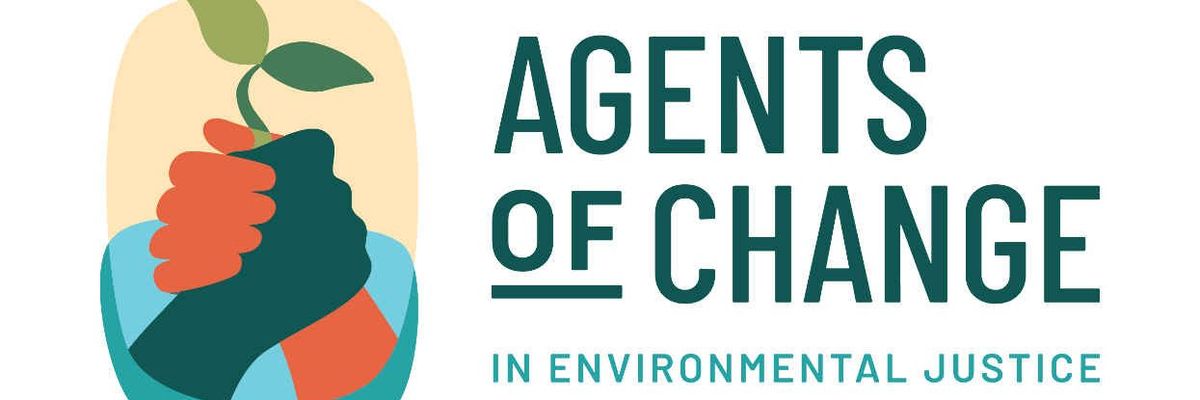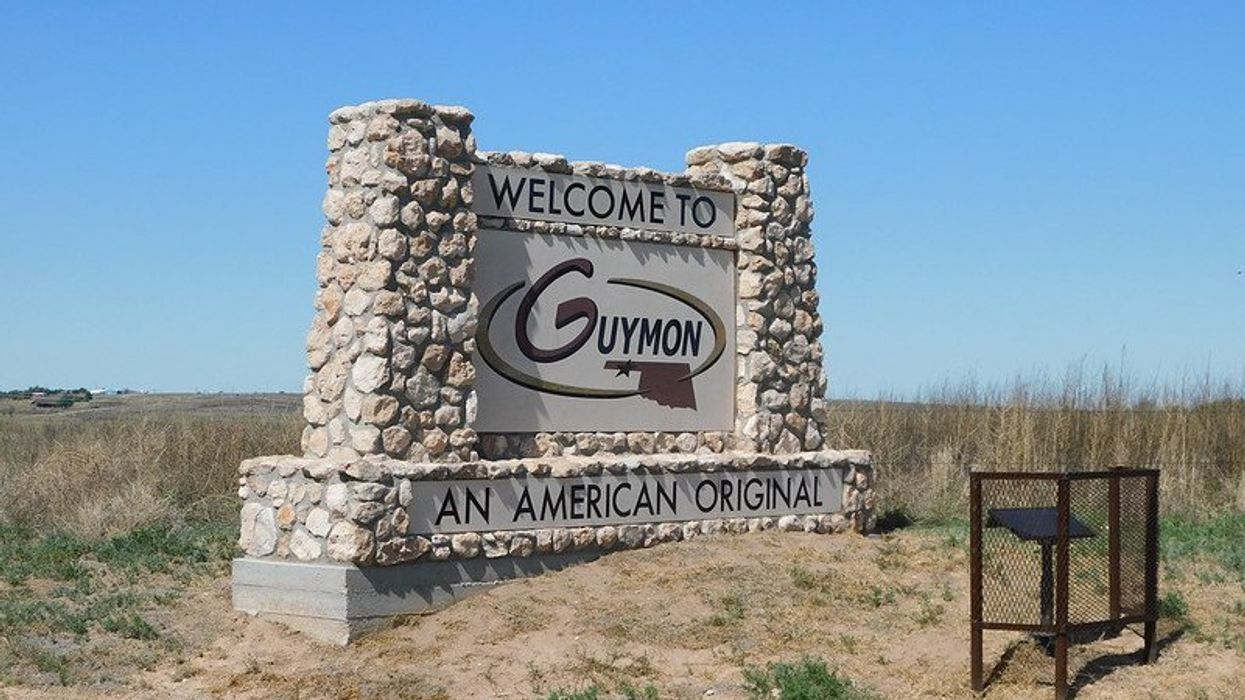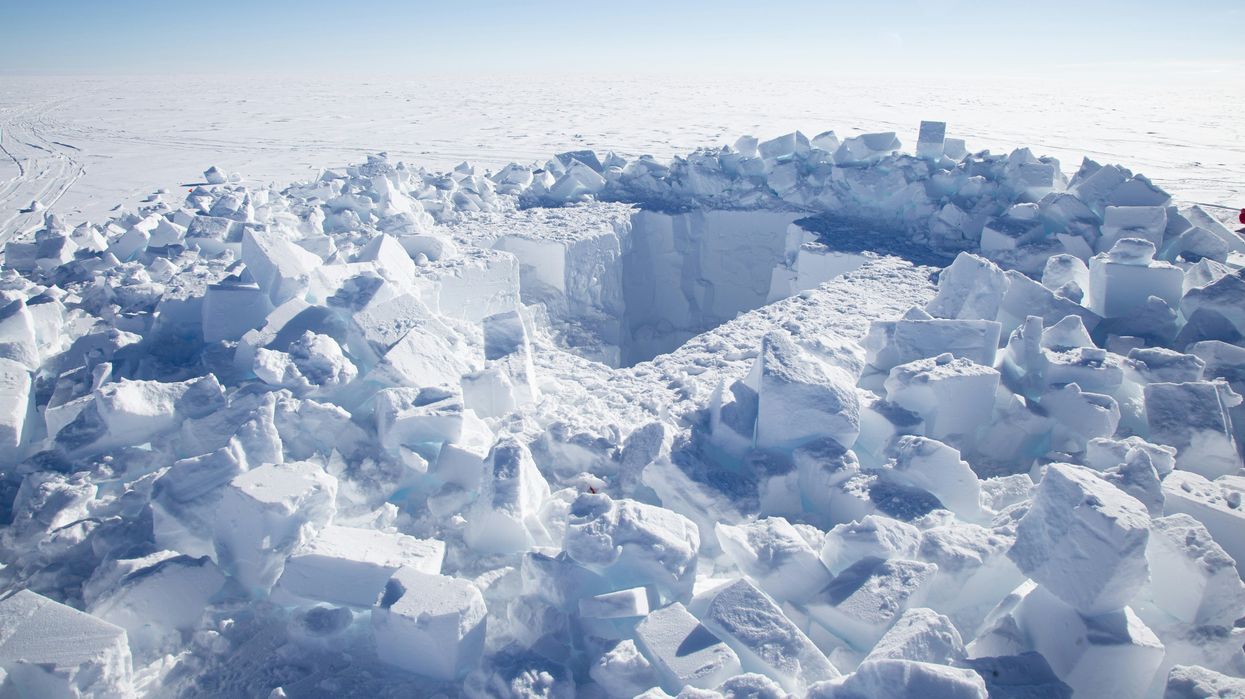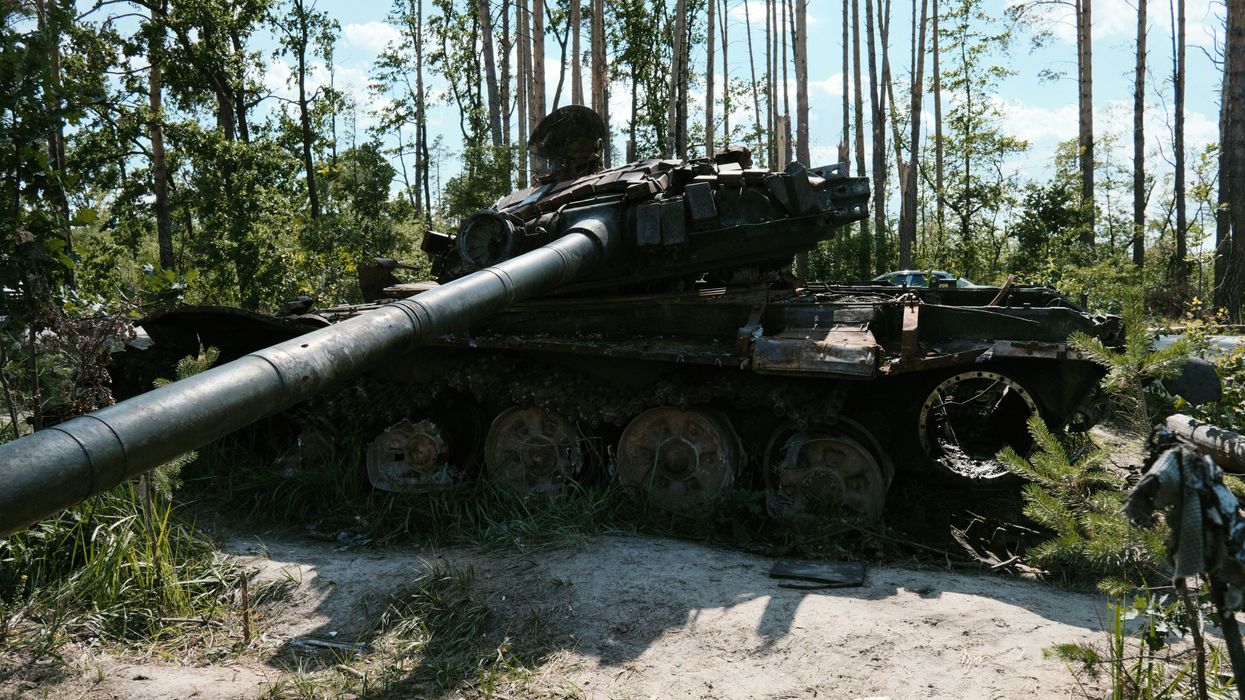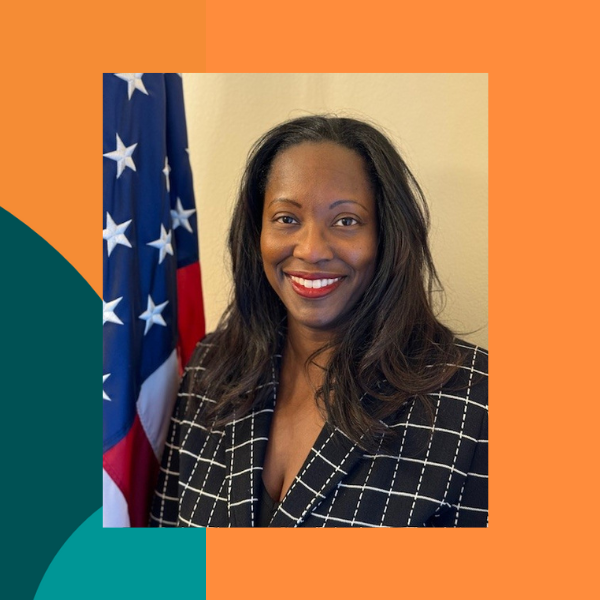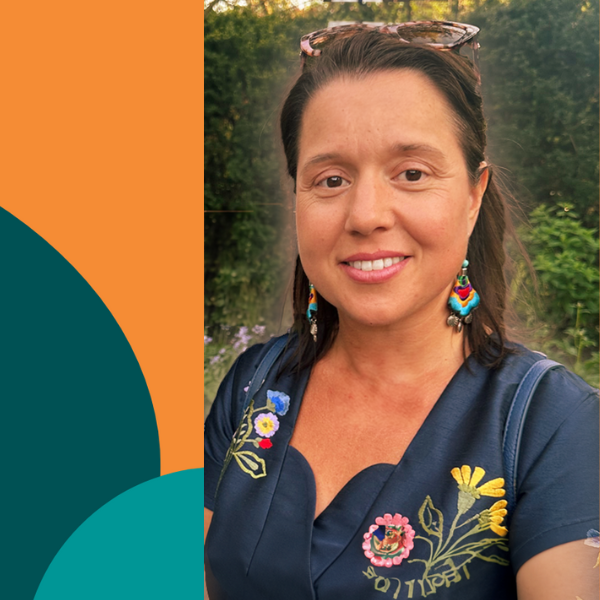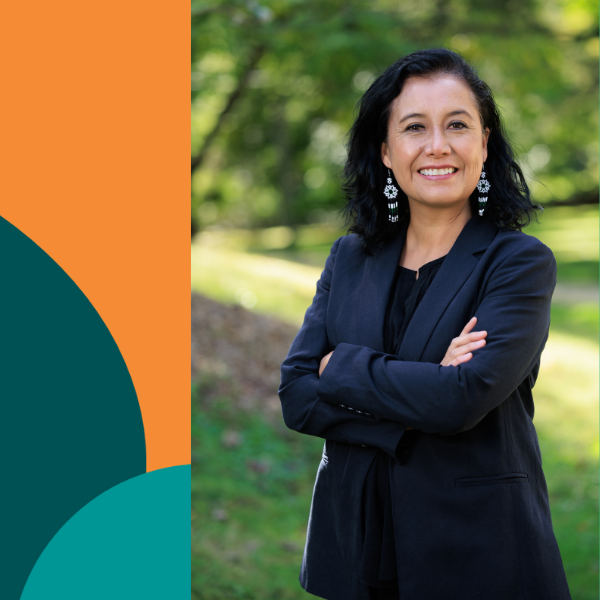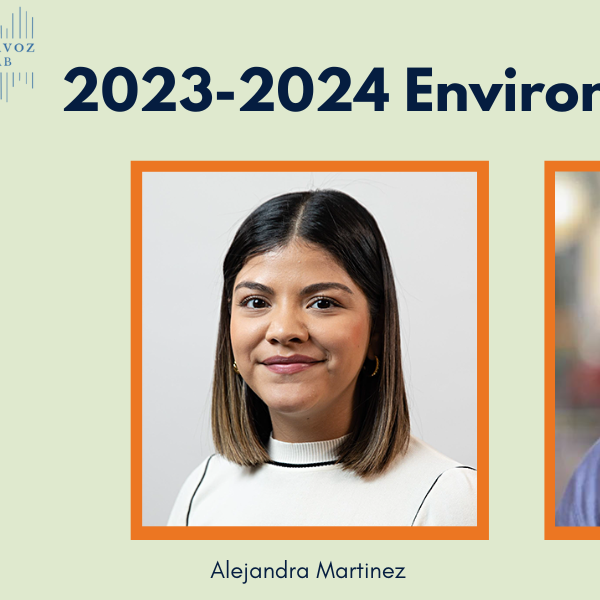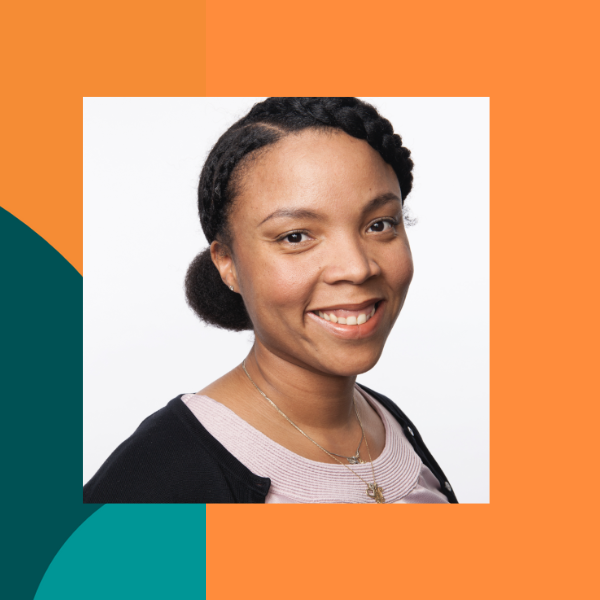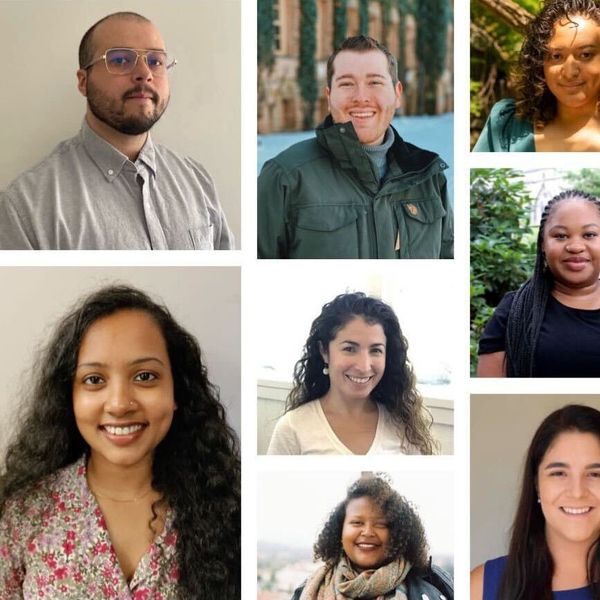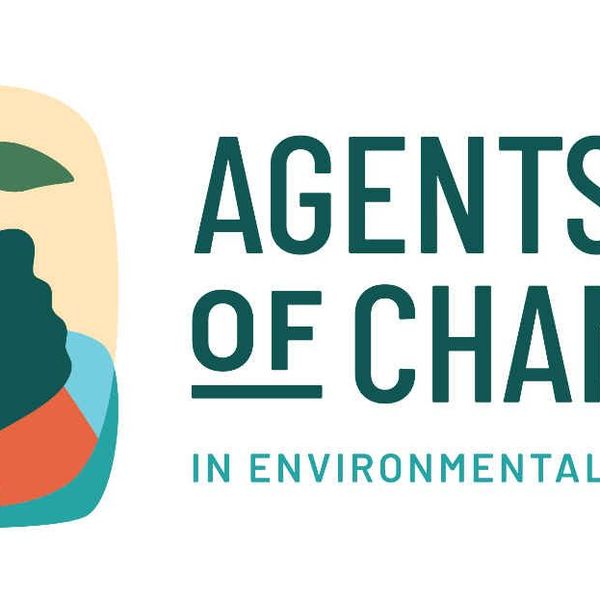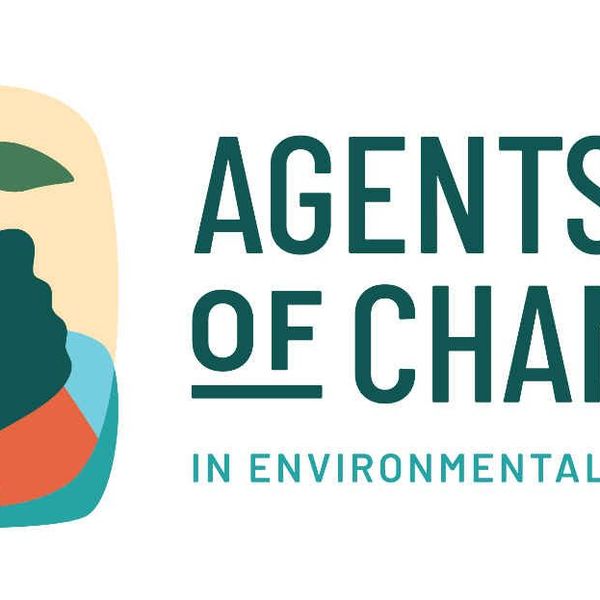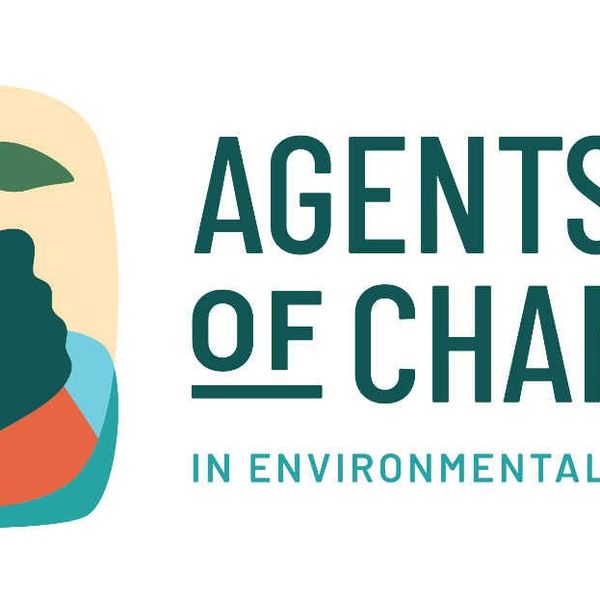Senior fellows Nsilo Berry and Sabah Usmani join the Agents of Change in Environmental Justice podcast to discuss the meaning and impacts of their unique names, and how words and naming impact the environmental justice conversation and movement.
Berry is a health impact researcher for the Healthy Building Network, and Usmani is a Ph.D. Candidate in the Climate and Health Program at Columbia University’s Mailman School of Public Health. The Agents of Change in Environmental Justice podcast is a biweekly podcast featuring the stories and big ideas from past and present fellows, as well as others in the field. You can see all of the past episodes here.
Listen below to their discussion, and subscribe to the podcast at iTunes or Spotify.
Transcript
Nsilo Berry
Welcome, everybody, to the Agents of Change collaborative podcast series here. My name is Nsilo Berry joined by Sabah Usmani. And today we're gonna talk about kind of how we came together for this podcast, some of these that we're going to talk about, and just really dove and just have a like a great, great conversation around naming what that means environmental justice, and kind of the impact that it means for us personally, throughout our journeys today. So Sabah, welcome, how are you today?
Sabah Usmani
How are you?
Nsilo Berry
I'm doing well, I can't complain. Here in Portland. I know people probably hit as late earlier, or later, excuse me. But right now, it's pretty chill. Not too bad, not too hot, or anything like that. Where are you coming in from?
Sabah Usmani
I'm in New York City in on the west side of the city. Just close to Columbia University where I'm a student.
Nsilo Berry
One thing that we really thought about when we're coming together for this idea is that through the Agent of Change earlier, we met in Philadelphia for our retreat. And as we were just talking, we're putting groups amongst the Leadership Group team from AOC. And we just started really just just having a conversation about, you know, introducing ourselves, where we're from. And one thing that really stuck out to both of usare our names and what they mean and kind of where they come from. And so one thing I want to kind of start off this podcast, Sabah, is talking a little bit about your name and why that's important. Because that'll drive us into the conversation of unique terming terminology in environmental justice and why giving names to certain things give things this certain identity, and a certain realism to the problem in order to address it fully head on. I think too much of kind of the space that we talk about now is like the abstract, makes problems harder to solve. But defining things as as a unique problem, like defining a person as a unique individual, provide just a lot more... a solid manifestation of the thing that you're looking at and who you're talking about. And so starting from there, Sabah, tell me or tell us about, you know, how your name came to be in, the impact of it and what that means for you today in the space of EJ?
Sabah Usmani
Sure. So maybe I can start with kind of defining the meaning of my name and what is what it means. So it's, it's an Arabic-origin name, and it's very common Muslim name for girls across the world, including in South Asia, where I'm from. So it means morning, which is really ironic, because I am definitely a night owl. And most recently, that has some some words related to kind of my personal experience, but relevant to my name. But I googled myself kind of a few years ago, as we always do once in a while –let's be honest– and I came across a kind of a tragic incident that kind of shook me to the core, I discovered the news of a young woman named Sabah Usmani who was brutally murdered with her five children in Essex, UK, and it was the only person in on Facebook that kind of shared the same name as mine. So I kind of felt this connection. Because learning about this horrific kind of hate crime was kind of a reminder for me of the prejudice and violence faced by individuals simply because of their name and identity. And, you know, the Islamophobia that's pretty prevalent across the world. Sure, but, you know, on a, on a positive note, you know, sometimes, you know, my name is also something that kind of connects me to many people around the world. So, you know, I get, you know, meet meet folks with Muslim names across the US and, and in India, and, you know, it's automatically there's, there's a connection of kind of a global community. You know, I take like a cab ride and you know, Uber driver will be like, will instantly recognize that my name is Arabic, and they may be from Africa, they may be from Sudan, a different country. And, you know, there is that kind of sense of, of a global community. That's, that's pretty prevalent, you know, and means a lot for me to have that identity. And makes me feel like this sense of broader community here in the US as well. But also, my name has been kind of a reason for kind of many experiences of microaggression, and discrimination also, that are faced in South South Asia, particularly in India. So there's, you know, all these stereotypes and prejudices that exists in every society. And you know, India is not an exception. So, you know, often like in school, in the 90s, and early 2000s, like a classmate asked me to, you know, not sing a patriotic song because I was Muslim, or, you know, in the 2010s, I was living in Mumbai, and I found it kind of extremely challenging to rent an apartment. And I was often rejected, not because of the way I looked, but because of my name, which was the only kind of identifying feature of my kind of cultural background. So it's kind of, you know, kind of a big topic, kind of, you know, it's been a big part of how connected, I experienced the world. And, you know, I'd love to kind of also learn more about your name, what it means and kind of your experience around that.
Nsilo Berry
Yeah, thank you so much for sharing that really, really interesting insight into kind of how your name came to be in the impacts that it provides you personally as well. For me, my name is picked up my mother when she was serving the military in the 90s. Similarly, Arabic as well, but also Somali background. And so one thing that is really unique about everything about my name is that my mother when it all ends, because her her family, her siblings are all EMPs. So Michael, Mitchell, and Michelle, my mother. And so she wanted to do the next space up in an alphabet, so and so my name is Nsilo, N-S-I-L-O. And that means fortunate prince. And I think for me, it happens in in a actually different, I think, I would say opposite way, like, I've never met another Nsilo during, you know, living in the US for most of my life, right? I went to Africa to do some work, which spoke about in a previous podcast with Agents of Change. But even there didn't meet too many, I didn't meet any Nsilos there. Similar like you, I did Google my name. And so if it's not me, coming up, it might be, you know, some some official in Africa, usually, so I did, I have seen the name being used before, obviously don't know if it said the same. But for me, personally, having that name, where, you know, you're only going to meet the Nsilo, this one Nsilo in your life, it's incredibly, you would think that I would have a big ego. And Sabah, I might, maybe just a little bit, no, I'm just kidding. But really, I always tell people, like, you know, "I can't be a criminal, because you know, my name is too is too unique, that I'm going to be found out whatever I do, like, I don't have like a John Doe, or, you know, Bill or Robert name, you know what I mean?" So, no, But jokes aside, for me, it was always about just my mother wanted to enforce the this the notion that people are unique individuals, and we are right, and your name should be kind of a, an indication of that, and then how it spreads to you. So So for me, it's this space where, where, you know, who am I as Nsilo, but also with kind of the the surname of of my last name, Berry, which represents the family as you mentioned, and that's where my connection is, you mentioned kind of connection for you, that's where my connection is for that. But also the freedom to go out and define who Nsilo is as a person in the world. It's something that I've taken kind of the the, the mantle and the wishes from my mother, and my brother with his name to about defining who I am and what I'm going to be in the space around me while representing, you know, the Berry family so to speak too, so. And I've always in need any deal with it, right? You deal with the mispronunciations and those things and how people would you know, don't get it or mispronounce your name or quoting something else? Or, or do those you know, microaggressions like you need to ease your name is like my name is only five letters, Joe, like it's not, it's not that hard. If you just listen to me, I promise you, I'm not trying to tell you how to say it wrong, right? And so and so it's always kind of this, but you for me, it all comes with the name. And it's something I would never give away for an easier name and just some just less kind of less daily friction. You know what I mean between you know, conversation and things like that. So, and even in the topic, so you talked about discrimination, like always thinking about like, what do I do think about is You know, job applications and put your name on certain things. And one thing I've I've come to accept is like, if I can't put my name on something as who I am as Nsilo, then this job is probably not for me, you know, even if I really want it, right, because, you know, I'm bleeding with a false perception of who I am. And I'm really, I'm fully Nsilo, and I have, and that's something I always, you know, live with, and, and define who I am as a person. And that being said, like I said, it provides this manifestation of, of when you stick it in a cell, you think of a person, and what that person represents, and I carry that with me wherever I go, and whatever job that I'm doing, and the friendships and relationships that I build together. So for me, that's kind of where that stems from. And I think about that when we talk about environmental justice, right? and about words and about things people are afraid to say or afraid to talk about. And that kind of leads me into kind of our first really our first interesting talking point. And so when we're talking about one thing we had in a conversation, Sabah in Philadelphia, during our retreat, we spoke about kind of environmental justice and not really and that term that really being like in popular term in India for you. Did it go by something else? During a time growing up? Did you learn that? "Oh, this what it was, but nobody really said that?" How did the term EJ kind of come into your, your vision, so to speak, when talking about environmental issues in India?
Sabah Usmani
Yeah, I mean, just just to kind of go back on your point on names, you know, I'm excited about the next generation of O's that are going to seriously that are going to show up. Yeah, and in terms of environmental justice, I think growing up in India and Nepal during the 90s, the early 2000s, and the 2010s. Kind of I learned about all the different kinds of social environmental justice movements, but like the term environmental justice was not like a prominent part of the mainstream discourse at the time. So I didn't know the term until I moved to the US and learnt about Dr. Robert Bullard's work in college. And it's not, you know, I learned that it's not just kind of about understanding, you know, the experience of how marginalized folks are disproportionately affected by environmental issues. But it's, you know, and especially people of color and low-income communities, but it's also actually about like, inclusivity, and including these communities and solving the problem. You know, I think it's something that's changing in the Global South, including in India, there is a term in Hindi party, and it's not commonly used, and kind of many of these movements historically aim to address the disproportionate impact of environmental degradation. Especially they will relate it to kind of protesting large development projects that had impactson kind of marginalized communities via while advocating for more equitable alternatives. So there was a movement called the Chipko movement and Chipko means "clinging to" in Hindi. It's a well known movement in the 1970s, in the northern state of Uttarakhand. And it was a grassroots response to the like deforestation that was happening and commercial logging, and so on. And it was led primarily by women. And there was another important movement against dam called the Narmada Bachao movement in the 80s, which was focused on opposing the construction of an of large dam dam projects, and the rights of tribal communities and farmers affected by the dam construction. And now there's, you know, I work on urban issues, but there's also like a lot of issues in urban areas with regard related to kind of informal settlements in India and other lower middle middle income countries, which, you know, these settlements, often disproportionately located in unsafe and polluted environments. But the term you know, in my own work, the term environmental justice is not used in our discussion with communities, it's not commonly used. But these are clearly like, you know, these are environment justice efforts. But the language of environmental justice and use of this term is not prevalent, especially at the time of these earlier movements. And even though some of these movements were not successful, they kind of helped really bring these ideas forward, about how we need to safeguard the environment and rights of marginalized communities today. So yeah, to be frank, like India still kind of lacks, like a coherent, ethical, you know, environmental justice kind of lens framework that consistently safeguards environmental and social justice. But these terms are an ill sort of a clear understanding of these, these kind of terms. Both demand and climate justice are important for these efforts, I think in low and middle income countries, but also they're really important for kind of these global negotiations. I have been exactly, you know, in multilateral conferences like the COP to, you know, correct the environmental injustice as we see at the global scale scale. So yeah, I think like, you know, a shared language and understanding of these kinds of environment, justice, climate justice and environmental racism, often kind of used interchangeably, it's kind of critical for, you know, both advocacy at the local also and global level. And for me, you know, personally it has kind of helped me contextualize my own experience in research focus in South Asia with this feeling of like a broader global environmental justice effort. So it's like, what I'm doing here in India is related to what what is happening here in Ecuador, or what is happening here in New York City in the Bronx. So I think these connections I wouldn't be able to make if I didn't have these terms. Yeah, I think it's really helpful for me to make these connections across my different work. But I, you know, I think it's really important that we don't use jargon that leaves folks out of the discussion.
Nsilo Berry
Sure.
Sabah Usmani
Because I always I personally, I always want to prioritize understanding and inclusion over the use of some jargon term. So like, for talking to, you know, folks, and they're not understanding, you know, I don't know, like, intergenerational equity like we can. Yeah, there are ways to explain that. And I think, you know, stories are a great way to kind of explain this, because, you know, when it comes to terms like intergenerational equity, I think it's a story about that would convey this complex meaning of this term better than using the term? Sure. Yeah. I think like, yeah, just just storytelling is a great tool we have kind of, for highlighting these terms and explaining them in a way that is accessible. And I think that's the most important thing, not the use of the term.
Nsilo Berry
And that's a great point. Yeah, some of that's you bring up like, you mentioned that, and I'm a firm believer that people connect with people. So you mentioned storytelling and being that a powerful mode of getting a point across and I will 100% agree with you like, the quantitative work is important to having the data and stuff that backup, what people are saying is also important. Because so many times in these areas, the Global South, low-wealth countries, people might say something, or even low-wealth communities in the United States might say "something's going on," right? But people say, "well, the data is not showing that." And then, months later, you find out that, you know, people get diagnosed with something or somebody happens in health care all the time, particularly amongst, you know, unfortunately, Black women, "hey, I'm going through this pain," and the implicit biases that are in our, in our healthcare systems, you see, will show up and you'll see the fact that you know, Black women died at a higher rate when it comes to pregnancy births, right. And it's really those type of things and having the combination between you know, power of storytelling, but also the data to back those things up to and listening and conveying points across helps build those bridges that you can then use, as you mentioned, be translational, across different places, different countries, you know, who will, you know, come from different cultures, speak different languages, but have this shared understanding of what we're talking about what we're going through. And for me, growing up in St. Louis, Missouri, like, the environment was nothing, it was kind of, I guess, the biggest thing that we spoke about when it came to environment was recycling, right? And so Earth Day and recycling but really, I came up in the air, I don't know if you remember this, Sabah, boxtops?So like, if you get like food and cereal, they had like this box top you can cut off at the top and you know, put into a bag and then you send it to your school and your school would have like classroom competitions, or maybe inter inter regional competitions, wherever the case may be. But for me, there was a disconnect between cutting off these Box Tops, recycling them, and what that actually meant for protecting the environment. And so for me, environmental justice was always this this term, where I knew the importance of taking care of the environment. I was in Boy Scouts were that's a big part of kind of our teachers that we we learned about and just internally within the household about respecting the space around you and, and respecting plant life, respecting animals and those type of things, but never thought about about, you know, the term environmental justice and and this is somebody who lived near an airport, Lambert airport, in St. Louis, for the majority of his childhood, right? So think while also like that, that lives near. Mosquito sprayers coming up and down the driveway. This is back when West Nile virus was a big thing. So we've had these big trucks of that will come and spray chemical plants throughout the year, I think usually in the summer, but we'd be outside playing and then you just see a truck come up with that. Just chemical spraying up the back and just thinking nothing of it. Like let's let's go back to playing tag, you know, and so, so for me EJ was like similar like you, even though it was a fight that was going on and on fenceline a lot of it was just internal teachings, and not too much externally, not too much formally. Until really, I started thinking about, you know, until I got into like high school and college, I started thinking about the impact of chemical plants and how they live near families and the impact that means for not just the family health, but financially, as well, like a lot of these places, the chemical plant that's near them, is the only billion dollar production facility in houses, they are marketed below value. So people can't like just move, you know, you would think like, hey, people can do that. But it's really, it's not that simple. And so that's kind of really how I came into the term of EJ, but like yourself as well, like, a lot of it was just hearing stories about people living near areas and seeing things and you can see certain, how, you might see a chemical facility and see the places around it, but you would, I'd never connected them really as environmental justice until formally being educated on things, you know, early later on, as they say.
Sabah Usmani
Yeah, it's really kind of interesting to hear about your kind of lived experience of environmental justice, right, and we see in the field as a whole, it seems to always kind of produce these new new terms and new new concepts. So I wonder if sometimes, all these different terms kind of fog our understanding of the issues of environmental justice that, you know, you just described, like people on the ground, and kind of even prevents us kind of properly addressing the problem? So I'd kind of love to get your perspective on that a little bit.
Nsilo Berry
Yeah, I think that that's a really great point. For me, one thing I you mentioned jargonearlier, and that's one thing that I, I don't like when we talk about when we start getting to like, these conversations is using jargon in the space of, of kind of, like academia, or using kind of, your professional experience, so to speak, as a way to kind of throw up impediments against, you know, people who are living the lived experience. And so for me, I think, like you said, keeping it simple for all parties involved in, in leaning on the prospects of storytelling is really critically important. I do think having too many terms and, and not really defining what they are, and just throwing them out casually, like, another one's like, intersectionality, right. Like, that's such a, that's a broad term, that can mean a lot of different things to a lot of different people in a lot of different scenarios. It can be something where it's, it's really, it becomes tough. And if you can't move past the jargon, then you don't get to what's important. And if you don't get to what's important, then you're not looking at to change anything. And so, for me, having simple in straightforward terms, and then surely, you know, as you become become more familiar with the community and more with familiar with the people who you're talking to, people can you can bring people up to speed on certain things, right. So it doesn't have to be something where, you know, at the moment, like, you know, when you're learning how to, you know, walk for the first time, and in doing those things, like they say, walk before you can run, like, you don't just start sprinting, like there's a, there's a process to doing these things. And, and that's okay to do that. And if some people are crawling, then some people are crawling, and whatever the case may be, some people can sprint, and some people can sprint, and, and so on, and so forth. So it's whatever, whatever suits kind of your speed and your mode, I think people like us who are in the space and trying to make a difference, and being the scientists and researchers, we should be open to all those individuals and be accepting of them and bringing them all in because all of them bring value as people who are experienced living experience, but also looking to make a difference in a solution to better their communities or queues they come from, etc. So that's, to me, that's really important, we're talking about trying to stay away from jargony terms and making them so complicated, where people stay focused on that term. And we can't move past that to look at the actual problem that we talk about. And so something like that is is is we talked about the word and kind of in the current form "woke", right? and what that means and and how it's being perverted today to mean other things than what it originally meant, as it's kind of this place of, of realization about certain things around you and systems and how to overcome these systems. But now it's been perverted as as this kind of moralistic agenda being used to brainwash people into into doing absurd things like just understanding you know, impacts of, of systematic racism and in now challenging the same that that doesn't even exist anymore. So things like that become become flipped on their head where we lose sight of like actually trying to make a difference in our communities, because we're stuck on a word. And that's being used as a, a, what's it called a platform kind of driver for political candidates to –particular on the right– particularly to to derail conversations that are extremely impactful in our societies. So, I remember you had some, you had some interesting kind of prompts about "woke" in about what kind of the state of being versus attaining it, and what that means the difference between that, too. So,
Sabah Usmani
Yeah, we were talking earlier about kind of the difference between "woke" as a state versus your book as an active effort, like staying woke, in a way, you know, with active engagement, and reading and learning and speaking to people and continuing to stay engaged, instead of having this dichotomy of like, these are people who are woke, and these are people who are not woke, and I think that's not very helpful. And I think as the active state of staying woke was something that I find, you know, that could be inspiring, you know, as you know, continuing to make that effort to stay engaged and, you know, look outside your own experience, you know, or privileged positions. So I think, you know, I, I find that could be a useful framing.
Nsilo Berry
Yeah, and that's a, that's a really great point, too, because, like, within being healthy. For me, like when it comes to exercising, like, you know, you get to the place, maybe you get to your goal weight, or whatever the case may be, but the key is, then you have to keep doing those things, even though you may not necessarily have to exercise as hard to get to that point, because you've overcome so much other things, obstacles before. So now, it's just like, maintaining Now, if that makes sense, but you still
Sabah Usmani
Same with woke, is a constant exercise
Nsilo Berry
Exactly, exactly right, exactly right, but if so, if I decide to not go to the gym, for the next three years, I'm gonna be back in the same position that I was trying to get out of, you know, when I was, you know, going to the gym, so, and like you said, it's a constant exercise. And like, many of these type of things, a lot of these things are constant with that, like, we're dealing with systematic problems. So they need systematic solutions. And, and that really means just honestly, sticking with something for continued time, continue effort, and it comes with continued resources, in order to see the results you're looking for. And then you know, that's going to become your new normal. But for us, getting stuck in, in, in the politics, and the minutiae of of the term, I believe completely derails us from, you know, the solution that we're looking at, right. And so, and so that's something that for me struggling with and wrestling with things like that, but also with like, the term, for example, people of color, something I think about often too, right? Because not too long ago, you know, colored people was a was a problematic term in the United States, specifically, when we're talking about black individuals. So, so now just kind of flipping that and saying people of color. And so for me, the question that, you know, I think about is do I want to really make this a situation where I get stuck on the term, and we can't move past the solutions that people are trying to bring to the table. For people of color, whether it's involving environmental justice issues, we can talk about homelessness, we can talk about mass incarceration, whatever we're going to talk about I think that's something that, you know, you have to learn to mature and grow past. Right. And that's, that can be a separate conversation, you know, some other time and a sidebar, and resolve to the issues. But if I'm making it about why are we, Why are we still say people of color? then we don't get to the environmental justice, the Fenceline communities, we don't get to those people in those issues, because I'm so set on trying to define exactly what this means and, and really define it for my own comfortability. And I was interested to see if is there anything that you feel is kind of like any term that you come across, or you think about, or that you wrestle with personally, Sabah, when it comes to kind of something similarly, as well, as I just mentioned,
Sabah Usmani
Being a person of color, I grew up in a country where almost everyone was a person of color. I think when I first moved to the US, it was also something that I was grappling with them like, "Oh, do you do they just mean non-white?" So I think like, you know, I was also kind of thinking through those terms, and what what feels authentic or useful to me, in different contexts. But, you know, they're often these terms that you may have even noticed in our conversation today, I often use terms like global South, low and middle income countries, or a number of different kinds of terms, you know, developing countries pretty interchangeably. And, you know, I think it's important to kind of know, the differences between these terms. And, you know, often like Global South, a lot of countries in the Global South are actually in the northern hemisphere. So it's, you know, in some mislabel, including India is in the northern northern hemisphere. And like LMI sees, like, people aren't familiar with that term. So when you use that, like you need to be, you know, it's not commonly understood outside like the development health community and developing countries like What do you mean by developing or Why are some countries developed? it still has like, kind of that colonizer-colonized relationship or, you know, so things like that. I think it's, you know, it's important to kind of think about what terms you're using and be really specific about it and understand these differences, even if you're choosing to use this so I think that's something I still grapple with what is the appropriate term. But yeah, as a concluding I think it was the you know, so really great to kind of chat with you and kind of problematize and think through all these different ideas around naming, our names, the kind of how we define environmental justice and our experience of these different terms and how that's impacted our own work, but also the the, the field as a whole. Could we learn a little bit more about your socials and where listeners can find you?
Nsilo Berry
Yeah, thank you so much for that. So but yeah, the conversation was great. Had a great time doing this with you. We were in the group I mentioned in the retreat, so shout out also, Marissa and Carolyn, Marissa Chan, Carolyn Ramirez, part of our cohort, they're part of our group too. So I know that that was a really fun group that we had a chance to do that. And we also did some work with kind of our community deliverable too, as well. But anyway, for the socials, you can find me on LinkedIn, Nsilo Berry, send a message, want to connect, send a DM I'm always happy to chat with some people I know some people have connected with me through Agemts of Change already. So I'm really excited about that. Also have the narrative essay out I'm around kind of social housing and public housing and looking at some of the ways that we can prove that that's on ehn, and also the age to change website to as well. And also the podcast I did with Brian as well. That's also on Spotify and all your other DSPs digital streaming platforms, we just talked about terms right so you can go find that there as well too. So I'm excited to kind of hear how this one comes out. And Sabah, interested in kind of hearing about where people can find you and things that you have going on.
Sabah Usmani
Um, so my research kind of focuses on good environment and environmental justice, environmental health in the US and as well as in India. And I'm you can find me at LinkedIn, and it's Sabah Usmani, as well as in Twitter on Sabah Usmani. Thanks so much.
Nsilo Berry
Thank you so much, everybody have a good one.
- LISTEN: Sabah Usmani on making cities healthy and just ›
- LISTEN: Jan-Michael Archer on the fight for environmental and workers’ rights ›
- Health research and its problem with the “R” word ›
- Words of wisdom from three leaders in the environmental health and justice field ›
- LISTEN: Ana Baptista on supporting environmental justice movement building in academia - EHN ›
- LISTEN: Greer Hamilton on arts-based environmental justice research - EHN ›

